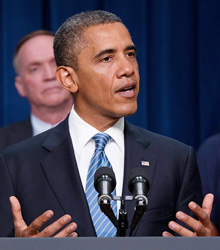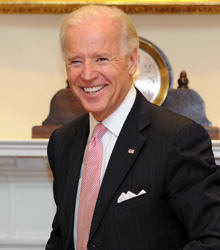|
 |
 |
|
Barack Obama (XINHUA) |
Joe Biden (XINHUA) |
As the United States' largest trading partner, China represents an increasingly important issue in the upcoming U.S. presidential election. Both presidential candidates, Democratic incumbent Barack Obama and former Massachusetts Governor Mitt Romney, have pledged a strong stance against unfair trading practices, concerns over human rights and intellectual property.
Tough words against China play well with American voters, say observers, but often fail to translate into actual policy. All presidential candidates over the past two decades have pledged to protect U.S. interests and correct trade imbalances. Once in office, U.S. leaders often seek a more cooperative relationship, bowing to U.S. business interests.
Though both candidates talk tough, there are some clear divisions in their positions.
According to the U.S. think tank Council on Foreign Relations, Obama sought a cooperative relationship with China during his term, launching a strategic trade dialogue in 2009 and welcoming Chinese President Hu Jintao for a state visit in January 2011.
The relationship between the two countries over the past four years hasn't been completely harmonious. Obama has criticized the Chinese Government's currency policies and confirmed a $5.8-billion arms sale package for Taiwan. Obama also created a Trade Enforcement Unit to investigate piracy and counterfeiting, specifically calling out "unfair trading practices in countries like China." In 2012, Obama filed complaints with the World Trade Organization (WTO) against China's exports of rare earth metals and taxes on imported U.S. vehicles.
The biggest strain to ties during the Obama administration perhaps came in April 2012, when Chen Guangcheng, a blind Chinese dissident and activist, sought protection at the U.S. Embassy in Beijing. For weeks, Secretary of State Hillary Clinton negotiated with Chinese authorities, who eventually allowed Chen to leave the country on a student visa. The agreement was widely praised in the United States as an expedient, non-confrontational solution that minimized interference with China's internal affairs.
Orville Schell, Arthur Ross Director of the Center on U.S.-China Relations at the Asia Society, called Chen's release a "victory" for China. "China showed either a new maturity, or a much keener sense of realism, perhaps recognizing that relations with the United States are even more important than the fate of a single dissident," Schell wrote in The Atlantic monthly.
Overall, Obama has aimed for a cooperative Sino-American relationship, saying, "In an interconnected world, in a global economy, nations—including our own—will be more prosperous and more secure when we work together."
Vice President Joe Biden took the lead in formulating the Obama administration's China policy over the past four years. The gaffe-prone vice president made headlines during a 2011 visit to China, when he said he "fully understands" China's one-child policy. Republican presidential candidate Mitt Romney pounced on the statement, calling the controversial one-child policy "gruesome and barbaric." Biden quickly backed down, calling the policy "repugnant."
According to the Council on Foreign Relations, Biden subscribes to the view that the United States should attempt to cooperate and build a positive relationship with China. In a 2001 speech before the Asia-Pacific Council of the American Chambers of Commerce, Biden said, "Our top priority should remain integrating China into the community of nations, articulating the rules of the road, and then holding the Chinese Government accountable for its actions."
| 